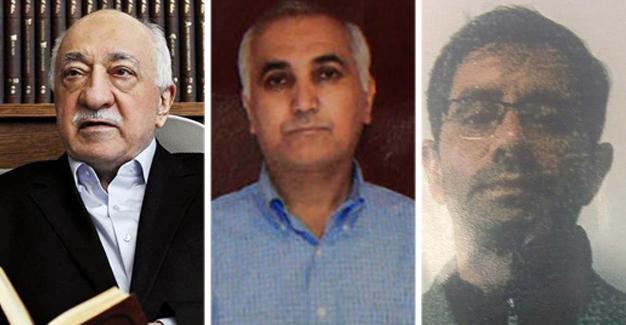Top three suspects revealed in case into acts in key Ankara air base during coup attempt
ANKARA
 The top three suspects in the case into coup actions in Ankara’s Akıncı Air Base during the July 15, 2016 failed coup attempt were revealed in an indictment prepared by Ankara Chief Public Prosecutor Yüksel Kocaman on March 31.
The top three suspects in the case into coup actions in Ankara’s Akıncı Air Base during the July 15, 2016 failed coup attempt were revealed in an indictment prepared by Ankara Chief Public Prosecutor Yüksel Kocaman on March 31.The 4,658-page indictment, which included a total of 481 suspects, named the U.S.-based Islamic preacher Fethullah Gülen as the prime suspect, while naming Adil Öksüz, the “Air Force imam” of the Fethullahist Terrorist Organization (FETÖ), and Kemal Batmaz second and third, respectively.
“Imam,” which traditionally refers to a religious public worker, is a term used by the Gülenist organization to mark local leadership.
Batmaz, who is under arrest, was found near the Akıncı Air Base and defended himself by saying he was around looking for land. Footage of him in the air base previously emerged, in which a ranked soldier was saluting Batmaz.
The indictment consisting of 570 files also said that Akın Öztürk was the head of the military wing of the coup attempt.
The Akıncı Air Base was used as the center of the failed coup attempt on the night of the foiled coup. Chief of General Staff Gen. Hulusi Akar and force commanders were taken to the base and held captive by pro-coup soldiers. However, they were all later freed in a special forces operation in the early hours of July 16, 2016. Its runways were also bombed to prevent F-16s used by the coup plotters from taking off.
President Recep Tayyip Erdoğan, Parliament Speaker İsmail Kahraman, Prime Minister Binali Yıldırım, Justice Minister Bekir Bozdağ and the lawmakers that were subjected to bombing in the parliament are listed as complainants.
In the indictment that included a general, six major generals, 18 brigadier generals, 22 colonels, 26 lieutenant colonels, 33 majors, 56 captains, 62 first lieutenants, 115 second lieutenants, 131 noncommissioned officers and one specialized sergeant; six suspects were named as civilian managers of the coup attempt and four were named as civilian suspects.
The prosecutor sought a total of 303 times aggravated life sentences for 45 names that were listed as managers of FETÖ, including Öksüz.
The indictment described the roles of civilians Öksüz, Batmaz, Harun Biniş, Nurettin Oruç and Hakan Çiçek during the thwarted coup and included the participation of coup activities by going to the Akıncı Air Base from the General Staff, Air, Land, and Naval Forces commands, Gendarmerie General Command, Humanitarian Aid Brigade, Special Forces Command, Communication Electronic Information Systems School and other military units.
The indictment also included the events of coup plotters joining the coup activities in the air base by arriving from planes that took off from the Central Anatolian province of Kayseri, southeastern province of Diyarbakır, the İncirlik Air Base in the southern province of Adana and Underwater Offence (SAT) Command in Istanbul. In addition, it featured the events that unfolded during the Combat Search and Rescue (MAK) team from the Central Anatolian province of Konya kidnapped the anti-coup commanders in Istanbul to the Akıncı Air Base.
According to the indictment, some 25 coup plotting pilots used F-16 warplanes during the foiled coup and 11 of those carried out bombardments. Two of the pilots were flying low over Istanbul and two others were assigned to track Erdoğan’s warplane. The other 10 pilots flew low over Ankara.
The prosecutor said that during the coup attempt, six F-16 warplanes took off from Diyarbakır without permission and three tanker aircrafts took off from İncirlik to provide fuel delivery.
The indictment also revealed the damage caused by the bombings. According to the prosecutor, the coup plotters caused damage worth 40 million Turkish Liras in the Aviation Department, 6,341,879 liras in the Special Operations Department, 7,349,500 liras in the Ankara police headquarters, 7,027,655 in TÜRKSAT buildings and 19,472,380 in the parliament.
“As a result of the investigations, it was understood that a total of 77 citizens were martyred, 222 were wounded and 96 properties got damaged,” the indictment said.
Details on Öksüz’s activities were also included in the indictment, which said that Öksüz downloaded the smartphone application ByLock, which came to prominence after it emerged that Gülenists used it to communicate, on Aug. 19, 2014 and his relatives were also using it.
Öksüz was determined to have received reception from the cell tower at Ankara’s Esenboğa Airport on July 18, 2016 at 8:01 a.m. and received another from Sabiha Gökçen Airport in Istanbul at 9:27 a.m. On the same day, he received service from the cell towers at the Üsküdar and Atatürk neighborhoods.
He used the cell station at the Akyazı district of the northwestern province of Sakarya on July 19, 2016 at 12:43 p.m.
It was previously revealed that he was called from the U.S. Consulate General in Istanbul on July 21, 2016.
















